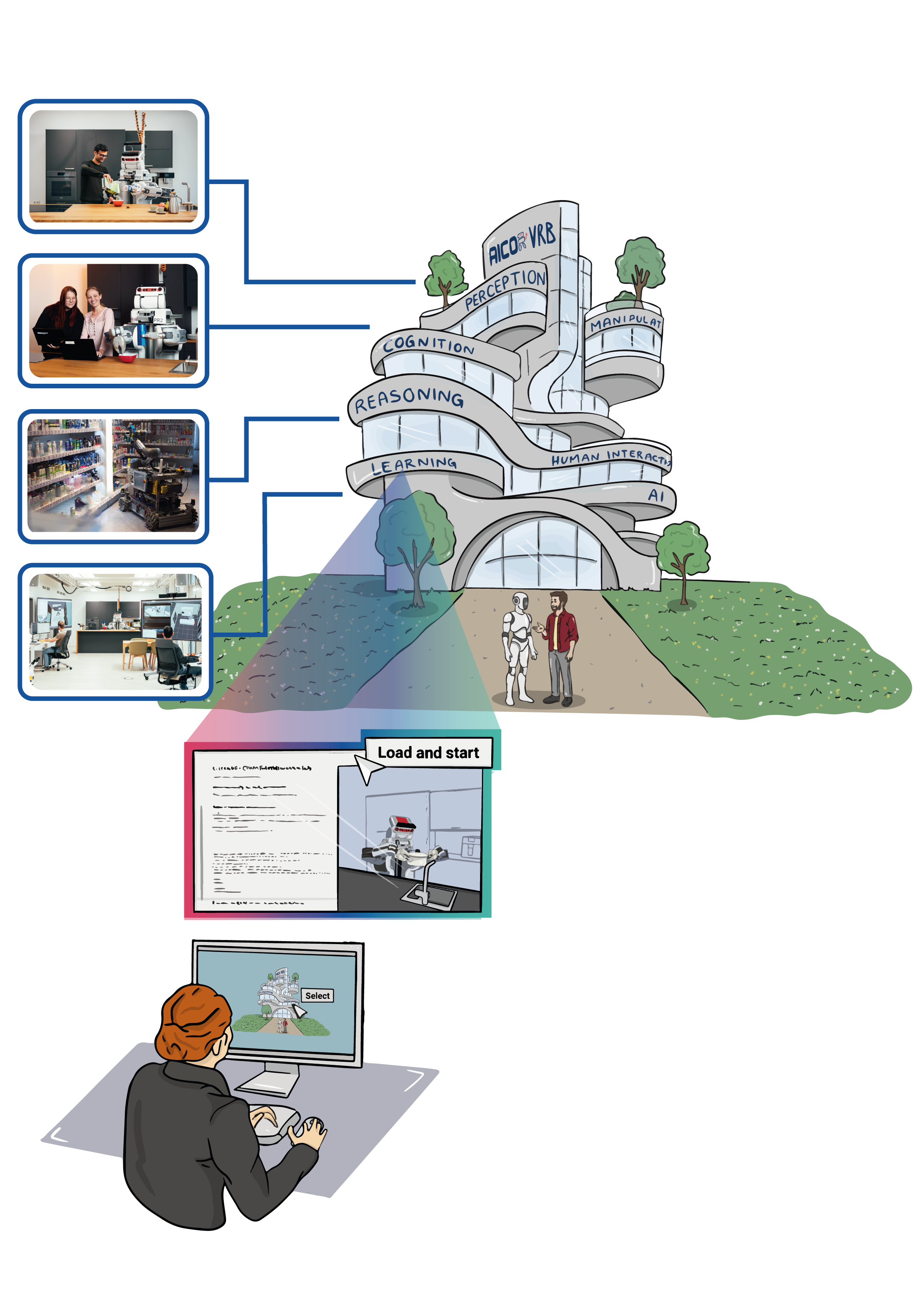The “AI-powered and Cognition-enabled Robotics” textbook represents a novel approach to education in the field of cognitive robotics. This interactive textbook is designed to offer an immersive learning experience, uniquely combining theoretical knowledge with practical application. It features video lectures from world-leading experts on various topics within the domain, providing students with first-class insights into the subject matter. Additionally, the textbook includes exercises that can be conducted within virtual research laboratories, utilizing open-source cutting-edge research software to bridge the gap between theory and practice. Students also have direct access to a wealth of resources and background material through a learning hub, enhancing their study and research capabilities. Currently in its early stages, the textbook offers an introductory chapter as a glimpse into its comprehensive educational approach, setting a new standard for academic resources in cognitive robotics.
AICOR for Newcomers
Visual Programming Interface
”AICOR for Newcomers” is an innovative educational initiative, designed to introduce high school students and other interested individuals to the captivating realm of AI-powered and cognition-enabled robotics. This program employs a visual programming interface powered by Blockly, offering an intuitive and user-friendly method for programming robots. Unlike traditional text-based coding languages, which can be daunting for beginners and young learners, Blockly simplifies the learning process, allowing participants to engage in programming activities without feeling overwhelmed. Through this approach, newcomers are given the opportunity to program robots within a virtual research lab environment to accomplish various tasks, such as making popcorn, serving dinner, and going shopping. ”AICOR for Newcomers” not only makes robotics accessible and enjoyable but also serves as a dynamic platform for discovering talent and inspiring future generations to explore the field of robotics.
Try out our online playground:
MAI@Home Competition Lab
MAI@Home (“Multimodal AI Reasoning Challenge @Home”) is a multimodal Embodied-AI competition proposed at ICRA ‘25. Here, AI systems are challenged to reason on multi-time spatiotemporal QA tasks in a daily living environment where your host human continuously changes the environment slightly.
In this competition, submitted systems must process not only the current status but also have to “remember” and manage the status of the complex and dynamic environment, a crucial aspect for practical applications in the real world.
One unique feature of this competition is that we provide spatiotemporal knowledge graphs and scene graphs in addition to the video footage, which can be considered a partial observation database that the agents can refer to as external knowledge.
For more information you can check out the competition website and the github.
In the notebook below you can try out some example queries on the knowledge graph and video data
The Virtual RoboCup@Home Arena
The virtual RoboCup@Home arena stands as a platform where student and researcher teams converge to forge the future of service and assistive robot technologies tailored for personal domestic use. As the premier international competition for autonomous service robots, it represents a significant segment of the broader RoboCup initiative, drawing participants from around the globe annually. Within this virtual arena, robots undergo a series of benchmark tests designed to rigorously evaluate their abilities and performance in an intricately simulated, realistic home environment that does not adhere to a standardized setting. The competition’s scope encompasses a wide range of domains including, but not limited to, Human-Robot Interaction and Cooperation, Navigation and Mapping in dynamic environments, Computer Vision and Object Recognition in varying lighting conditions, Object Manipulation, Adaptive Behaviors, Behavior Integration, Ambient Intelligence, as well as Standardization and System Integration. This diverse focus aims to push the envelope in autonomous domestic robotics, challenging teams to innovate in ways that significantly enhance the practicality and integration of robots into everyday life.
The EASE Learning Hub
The EASE Learning Hub emerges as a pivotal educational platform, offering a wealth of open educational resources specifically tailored for AI-powered and cognition-enabled robotics (AICOR). This hub is a product of the collaborative efforts of the research center EASE (Everyday Activity Science and Engineering), dedicated to advancing the understanding and application of everyday activities in science and engineering contexts. It serves as a treasure trove of knowledge, featuring an extensive collection of video lectures that delve into various critical topics such as cognition, robot perception, knowledge representation, and planning, among others. Many of these insightful lectures were delivered during the international EASE Fall Schools, making cutting-edge research accessible to doctoral students and other researchers. Additionally, the hub provides numerous virtual training sessions and tutorials focused on key software components essential for developing AI-powered and cognition-enabled robot agents. This makes the EASE Learning Hub an invaluable resource for students, researchers, and enthusiasts eager to deepen their understanding and skills in the field of intelligent robotics.
The euROBIN Coopetition (= Cooperative Competition) Arenas
The euROBIN Coopetition arenas represent a groundbreaking approach to robotics competitions, blending cooperation with competition across three distinct euROBIN leagues, each designed to address key societal challenges through robotic innovation. In the realm of ”Robotic manufacturing for a circular economy”, the Industrial Robots League introduces a novel competition focused on robotic manipulation, featuring an industry-endorsed benchmark that utilizes an internet-connected electronic task board. This board, equipped with a battery-powered microcontroller, meticulously records user interactions and task execution times, broadcasting this data to a public web dashboard and EuroCore for comprehensive analysis. The ”Personal robots for enhanced quality of life and well-being” league challenges participants to push the boundaries of service and assistive robot technology, with a particular emphasis on applications within personal and domestic settings. Meanwhile, the ”Outdoor robots for sustainable communities” league aims to advance the capabilities of autonomous delivery robots, covering both aerial and ground-based platforms, in support of creating more sustainable communities. Together, these arenas foster a unique ”Coopetition” environment where innovation, collaboration, and competitive spirit drive the development of robotics solutions tailored to meet pressing global needs.
Lecture Course: Robot Programming with ROS
The lecture course ”Robot Programming with ROS” offers an immersive and practical approach to learning the intricacies of programming robots using the Robot Operating System (ROS). Set within the innovative context of virtual research building laboratories, this course provides students with a unique opportunity to apply theoretical concepts in a simulated real-world environment. The course materials, including exercise sheets and programming environments, are readily accessible on GitHub, allowing students to dive into practical, hands-on exercises that significantly enhance their learning experience. This deliberate integration of practical examples into the curriculum is designed to seamlessly connect theoretical knowledge with real-world application, equipping students with the necessary skills and confidence to tackle the challenges of robot programming in various professional settings. Through this course, learners are not just exposed to the fundamentals of ROS but are also prepared to navigate and innovate within the evolving landscape of robotics technology.
Lecture Course: Actionable knowledge representation
The lecture course ”Actionable Knowledge Representation” delves into the sophisticated realm of making abstract knowledge actionable in the perception-action loops of robot agents. The course utilizes the advanced resources of the AICOR virtual research building. This includes leveraging the comprehensive knowledge bases of the KnowRob system, the interactive capabilities of the web-based knowledge service openEASE, and the practical scenarios provided by virtual robot laboratories. The course is designed to explore the methodologies of representing knowledge in a form that is both machine-understandable and actionable, focusing on the acquisition of knowledge from diverse sources such as web scraping and the integration of various knowledge segments. It addresses the critical aspects of reasoning about knowledge and demonstrates how this knowledge can be utilized by different agents — ranging from websites and AR applications to robots — to assist users in their daily activities. The practical component of the course is facilitated through platform-independent Jupyter notebooks based on Python, ensuring accessibility and minimal software requirements for all participants. With course materials hosted on GitHub, students are provided with an accessible and comprehensive learning experience that bridges the gap between theoretical knowledge representation concepts and their practical applications in enhancing daily life through technology.




